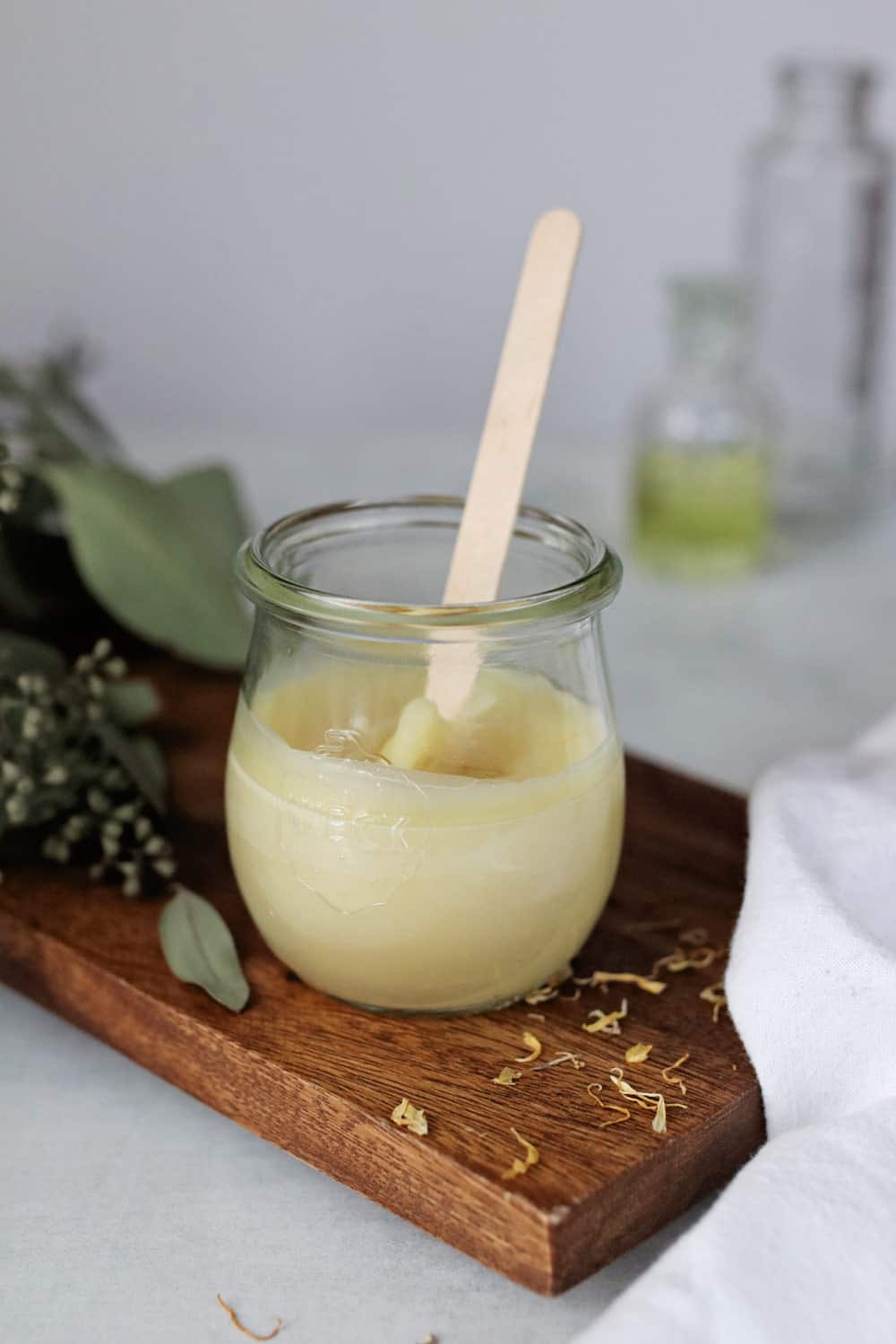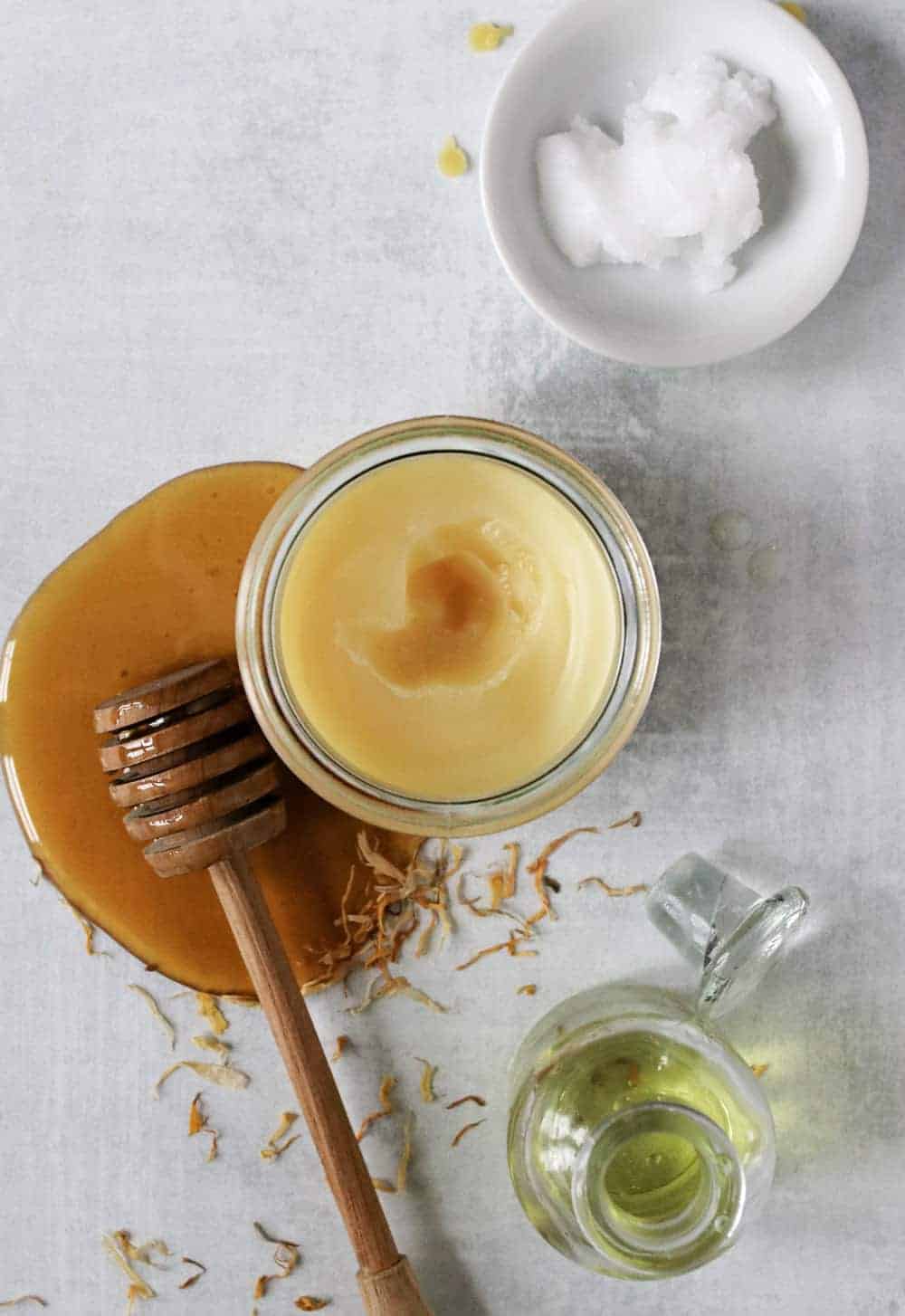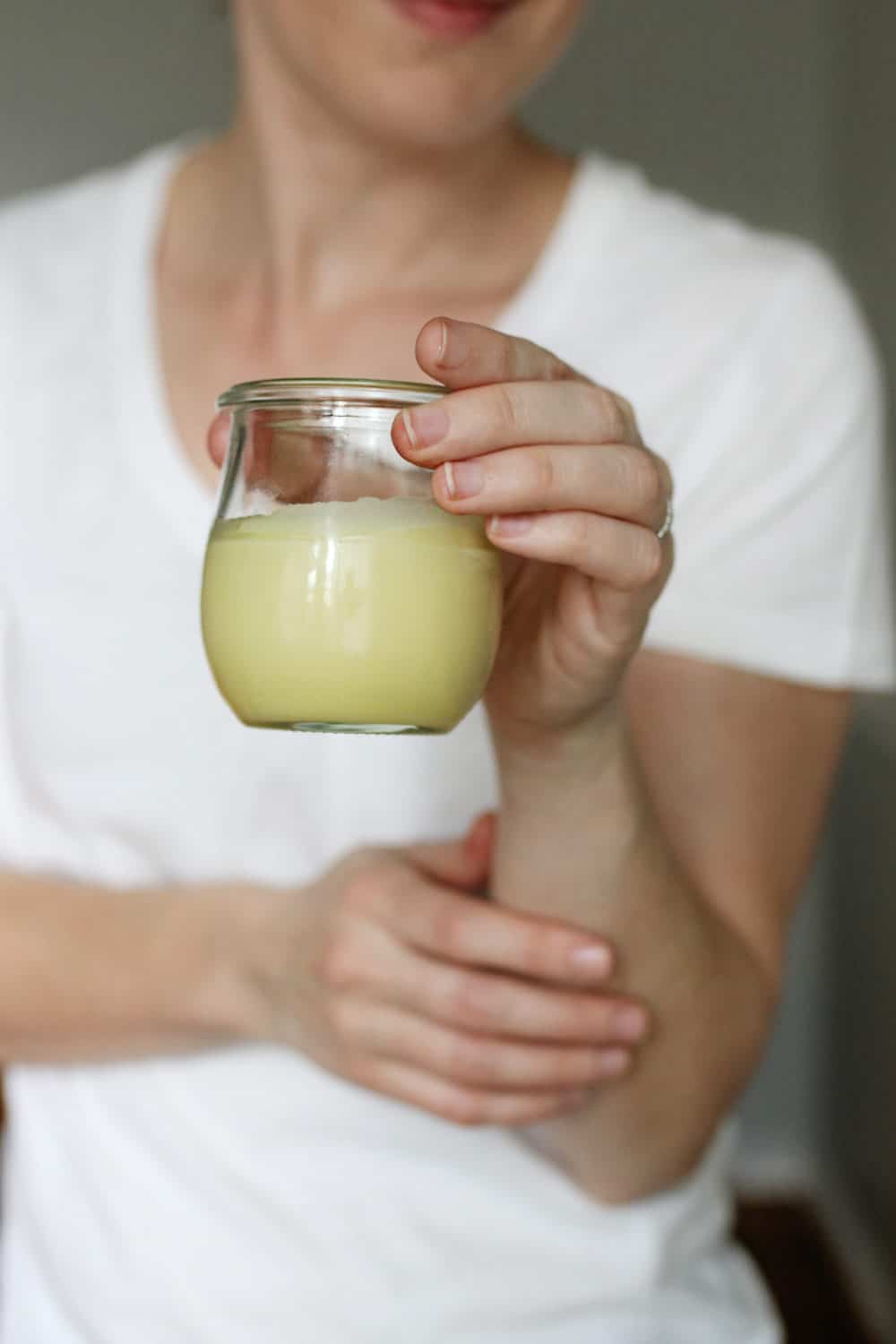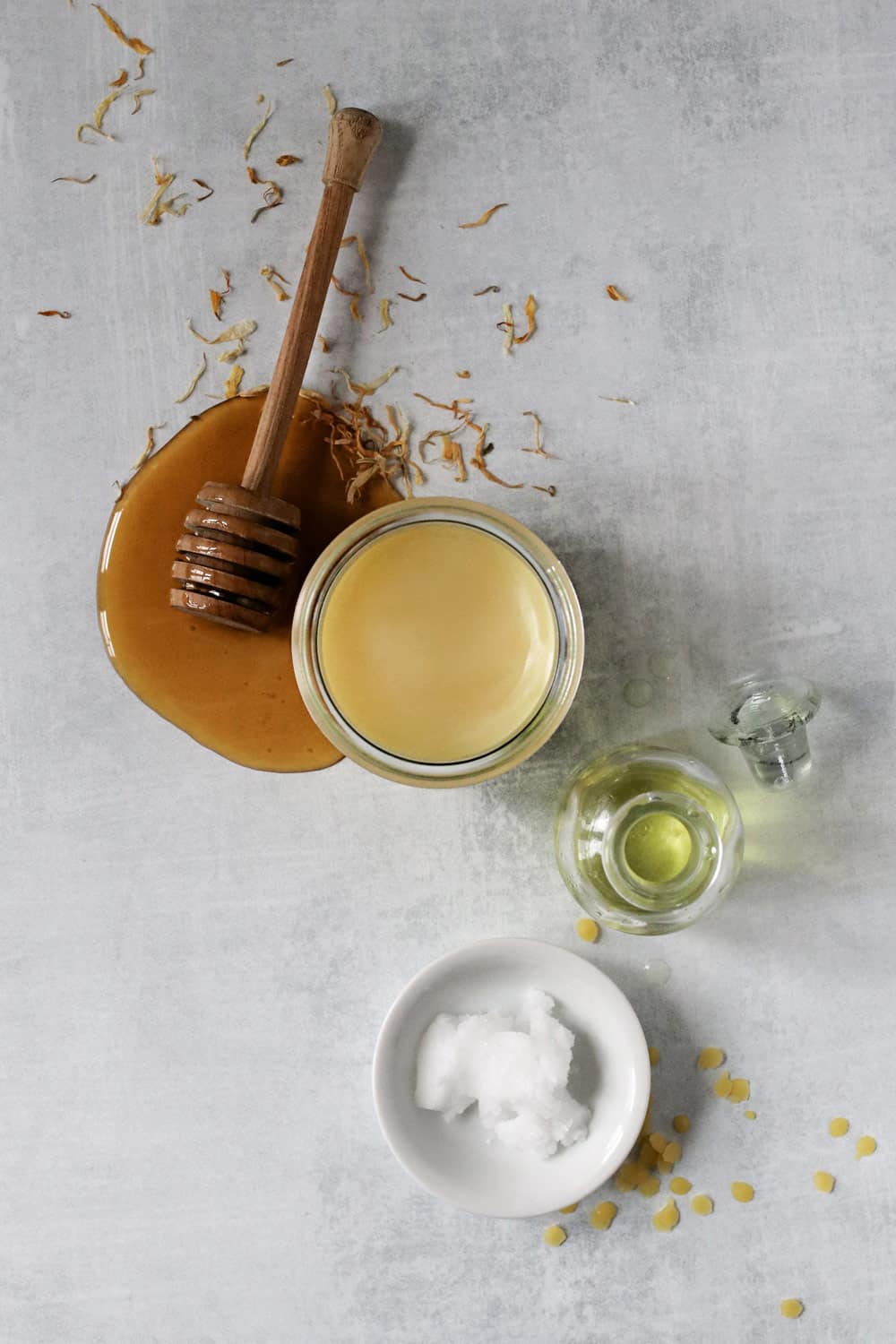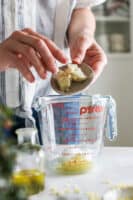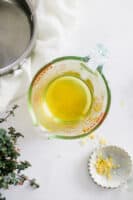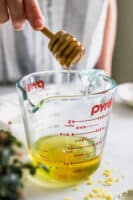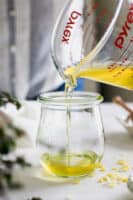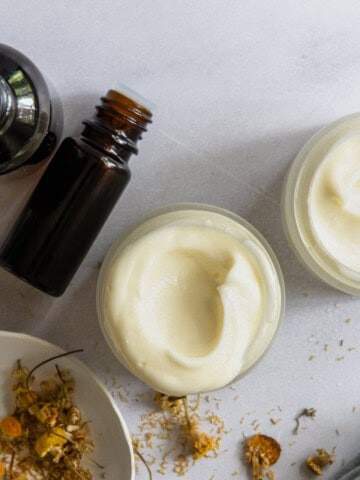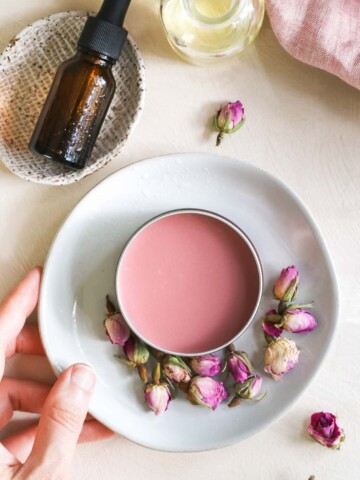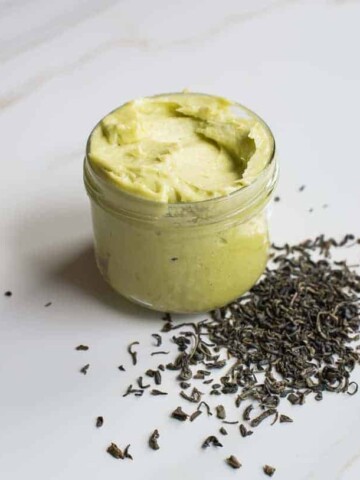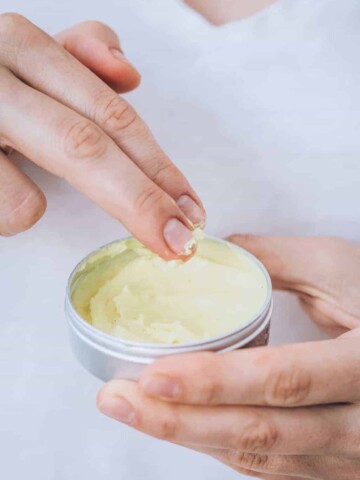As far as skin conditions go, eczema has to be one of the worst. I had eczema as a kid, and although I was lucky enough to outgrow the roughest years of it, I still get a flare-up every so often. The inflammation and itch are bad enough, but I’d say it’s the pain that makes it unbearable. This natural homemade eczema cream made with skin-soothing essential oils for eczema, would have saved me years of misery!
Homemade eczema cream is a great option for those who suffer from eczema, a condition that causes skin to become dry, itchy, and inflamed. Making your own eczema cream allows you to control the ingredients and avoid potential irritants found in store-bought creams. When creating your own eczema cream, it's important to choose ingredients that are gentle and nourishing for the skin. Ingredients such as shea butter, coconut oil, and almond oil are great choices for their moisturizing and anti-inflammatory properties. Beeswax is often used in homemade creams to provide a thick and creamy texture that's easy to apply. It's also important to choose essential oils that are safe for use on sensitive skin, such as lavender oil or tea tree oil.
Using a homemade eczema cream can be a great addition to your eczema skincare routine. Applying the cream regularly can help soothe dry and itchy skin, and provide relief from eczema symptoms. It's important to keep in mind that everyone's skin is different, and what works for one person may not work for another. If you have severe eczema or are experiencing a flare-up, it's best to consult with a dermatologist before trying any new treatments or skincare products.
Homemade Eczema Balm
This all-natural oil-based balm is a godsend for irritated skin. I keep a jar on my bedside table to remedy flakiness and inflammation all year long. The main ingredient is coconut oil, an intensely hydrating oil that is perfect for chapped, irritated skin [source]. Plus, beeswax and almond oil give you an emollient-rich balm that locks in moisture and protects your skin from the elements.
But it’s the raw honey and essential oils that do most of the heavy lifting. Honey is said to be one of nature’s most powerful soothing agents. It helps kill bacteria, reduces inflammation, and calms the itch that comes with eczema [source].
And essential oils like chamomile and cedarwood help put out the fire [source] and repair your skin’s moisture barrier. That being said, it’s important to remember that the causes of eczema vary from person to person.
Experiment with essential oils and find a blend that’s perfectly tailored to you and your skin’s needs. Because allergies and environmental triggers often play a role, and what works for one person might not work for another.
10 Best Essential Oils for Eczema
Essential oils can be very helpful when managing symptoms of eczema. They offer a completely natural solution to help deal with symptoms while you figure out what your triggers are.
When choosing essential oils for eczema, you’ll want to use oils that are anti-inflammatory, gentle, and soothing to the skin. If you’re struggling with eczema, the skin will already be sensitive and irritated, so it’s important not to do anything that will aggravate it more.
Additionally, you’ll want to dilute the essential oils with a skin-soothing carrier oil, such as jojoba or coconut, in a very low percentage to keep from causing more irritation and maintain constant moisture.
Essential oils aren’t a one-size-fits-all remedy, but with a little trial and error, you’re sure to find a blend that succeeds in soothing your eczema symptoms. Here are some of the best essential oils for eczema.
1. Lavender
Surprise, surprise! Lavender tops the list as one of the best essential oils for eczema. Not only is lavender incredibly soothing, but it's gentle enough to use even on young children, making it a great option to consider for childhood eczema.
Lavender oil has exceptional anti-inflammatory and anti-itch properties [source]. It’s often used to soothe the redness and irritation associated with atopic dermatitis. Plus, it is a natural antibiotic that helps prevent infection from some of the most prevalent skin bacteria [source].
2. Chamomile
There are different types of chamomile, but German chamomile is great at calming acne, eczema, rashes, dermatitis, and other troubling skin conditions by encouraging cell regeneration so new, healthy skin can take its place [source].
Roman chamomile is a great choice for eczema, particularly for children. It has a very pleasant, calming aroma that can be especially beneficial if your child is fussy due to the uncomfortable symptoms of eczema. The essential oil is also a great anti-inflammatory, is soothing on the skin, and may even help ease some of the discomfort associated with eczema directly [source].
3. Frankincense
Frankincense oil is a favorite among essential oil users because of its versatility and has been used for hundreds of years to heal skin conditions of all kinds.
In fact, frankincense contains soothing and anti-inflammatory properties and has even been found to reduce redness and irritation on the skin—making it a no-brainer for eczema [source]. Not only does it reduce swelling and redness [source], it's even been shown to have anti-cancer effects [source].
4. Geranium
With an aroma that is reminiscent of rose, geranium is a much more affordable option, with therapeutic properties that can benefit symptoms of eczema. Geranium essential oil is anti-inflammatory and can be used for a number of bothersome skin issues, including itchy, irritated, or inflamed skin caused by eczema [source].
Just a dab or two of geranium oil is enough to reduce swelling and pain associated with cracked, irritated skin [source].
5. Tea Tree
While it may not smell quite as pleasant as some of the other essential oils on this list, tea tree oil is one of the best essential oils to use on the skin. Although it has a potent medicinal aroma, tea tree is surprisingly gentle and has antiviral, antifungal, and antibacterial properties to boot [source].
It’s also great to use on inflamed and irritated skin. And when paired with a more pleasant-smelling essential oil, like lavender, it can make an excellent topical blend for itchy, uncomfortable skin.
6. Helichrysum
Helichrysum may be one of the pricier essential oils on this list, but since only a little bit is needed for you to feel its therapeutic effects, it turns out it’s actually pretty cost-effective. And to be totally honest, adding helichrysum to your stash is worth it.
It’s well-known for its soothing and regenerative properties and is frequently used in skin care formulations. It can be used for a number of skin issues, including irritated skin and wounds [source], making it ideal to use for eczema─especially if you’re dealing with cracked and broken skin.
7. Rose
While rose oil is by far the most expensive essential oil on this list, if you’re able to splurge on it, you should. Not only is it a wonderful oil for the emotions, but it’s also fantastic for your skin.
Rose essential oil contains anti-inflammatory and antioxidant properties [source] and is even believed to help with skin renewal [source].
8. Cedarwood
Cedarwood oil doesn’t just treat the symptoms of eczema; it helps heal the condition as well, thanks to its anti-itch and anti-inflammatory properties [source].
9. Bergamot
Bergamot oil is often used to reduce inflammation, so skin can heal more quickly [source].
10. Thyme
A natural antiseptic, thyme oil is a great defense against pain, swelling, infection, and inflammation [source]. However, it can be a skin irritant, so use in very small dilutions until you see how your skin reacts.
How to Use Essential Oils for Eczema
The key to healing eczema is to keep the skin moisturized at all times. Now that doesn’t mean just to put some lotion on once and a while.
Eczema-sufferers need heavy intervention with thick emollients (oily substances) that will remain on the skin for long periods, helping to restore the natural skin barrier and squelch the itch. If you can calm the itch with emollients and no longer have the need to scratch, the skin will heal itself naturally, and the eczema will be gone.
If you have a tendency toward skin irritation and eczema, you must do this ALL OF THE TIME. There is no way around it. Most people have a pattern whereby their skin gets bad, they treat it, and it improves, so they stop!
Nope. You can’t do that, because it will inevitably start again. If the skin is heavily and deeply moisturized 24 hours a day, the chances of the condition returning are very low. So, it’s maintenance, baby, all the way!
As always, do a test run before making a large batch of eczema balm, and give it time to work before trying new oils. Unlike a lot of prescription creams, essential oils work slowly, so you need to apply them regularly to see results. And feel free to mix and match oils or add in new ones to find a combination that works best for you.
Soothing Eczema Balm Recipe
—½ cup coconut oil (even better if you can use an infused herbal oil like calendula oil.)
—¼ cup shea butter
—2 tablespoons beeswax pastilles
—2 tablespoons almond oil (you can substitute an oil like grapeseed if you're allergic)
—¼ cup organic raw honey
—20 drops lavender essential oil
—15 drops cedarwood essential oil
—15 drops frankincense essential oil or any of the other oils mentioned here
How to make an eczema balm
1. Place the coconut oil, shea butter, and beeswax in a heat-proof glass jar—I find a Pyrex measuring cup works great for this—and microwave in 30-second intervals until completely melted. Alternatively, you can place the container in a small saucepan filled halfway with water and heat on low until the oils have melted.
2. Set the melted oils aside for 15 minutes to cool slightly. This helps preserve the active compounds in the honey and keeps it from separating as the mixture cools.
3. Add the honey, almond oil, and essential oils. Stir to combine.
4. Transfer the balm to a small tin or lidded glass jar, and let it cool completely. Mark the date on the jar and use within a year.
How to manage eczema
Dealing with eczema can be frustrating and uncomfortable, but the key is to try and figure out the trigger so you can determine what’s causing it. In some cases, it is not that hard to find the cause, and there are many steps you can take that may help reduce or eliminate the symptoms of eczema.
Here are some simple things that may help you determine the cause and help manage your symptoms:
—Stay adequately hydrated
—Avoid heavily perfumed detergents
—Limit what you put on your skin
—Switch to natural body care products like this body balm
—Keep skin naturally moisturized ALL THE TIME
Eczema Balm FAQs
The honey settles to the bottom as my balm cools. What gives?
Honey is water-soluble, whereas this balm is mostly oil. That means the honey has a tendency to separate and sink as the mixture cools. One way around this is to let the oils cool considerably before adding your honey.
While I recommend letting the melted oil mixture sit on the counter for at least 15 minutes before adding honey and essential oils, it may still be too hot, in which case you need to let it sit longer. I sometimes try to wait until the balm starts to form a solid layer on top. Then I mix everything together again and add the remaining ingredients, stirring intermittently as it cools.
You can also add 2 tablespoons of emulsifying wax prior to melting your oils. Then follow the above instructions to prevent separation.
This balm has a sticky texture, is there any way to get rid of that?
Just use less honey.
Can you omit the honey entirely?
Yes, although honey is part of what gives this balm it's soothing benefits. If you do choose to leave it out, feel free to add a couple more drops of your chosen essential oils.
Are there any vegan alternatives to honey or beeswax I can use?
Sure. Pure maple syrup is a humectant and has antioxidant properties, much like honey. And carnauba wax is a great vegan alternative for beeswax.
What’s the shelf life?
Your eczema balm should last 1–2 months without the need for refrigeration. Or you can store it in the refrigerator for up to 1 year. Like all homemade beauty products, if you notice a change in smell or consistency or if you see mold, toss it out.
Is there a quick homemade eczema cream I can make?
There are many different recipes you can use to create your own eczema cream at home. A simple recipe involves combining shea butter, coconut oil, and beeswax, along with a few drops of essential oils known for their skin-soothing properties. This homemade eczema cream can be applied to affected areas up to three times a day for relief.
Ready to reap more of the healing benefits of honey and botanicals?
Try some of these skin-soothing DIYs:
Soothing Homemade Oatmeal Soap
The Best Essential Oils for Inflammation
How to Make Herb-Infused Balms for Healing and Headaches
Soothing Eczema Balm
Equipment
- Heat proof glass jar or Pyrex measuring cup
- Saucepan (optional)
- 8-ounce glass jar with lid
Materials
- ½ cup coconut oil
- ¼ cup shea butter
- 2 tablespoons beeswax pastilles
- 2 tablespoons almond oil
- ¼ cup raw honey
- 20 drops lavender essential oil
- 15 drops cedarwood essential oil
- 15 drops thyme essential oil or any of the other oils mentioned in the post
Instructions
- Place the coconut oil, shea butter, and beeswax in a heat-proof glass jar—I find a Pyrex measuring cup works great for this—and microwave in 30-second intervals until completely melted. Alternatively, you can place the container in a small saucepan filled halfway with water and heat on low until oils have melted.
- Set the jar of melted oils aside for 15 minutes to cool slightly. This helps preserve the active compounds in the honey and keeps the honey from separating as the mixture cools.
- Add the honey, almond, and essential oils, and stir to combine.
- Transfer the balm to a small tin or lidded glass jar, and let it cool completely.
Notes
This article was medically reviewed by Dr. Gina Jansheski, a licensed, board-certified physician who has been practicing for more than 20 years. Learn more about Hello Glow's medical reviewers here. As always, this is not personal medical advice, and we recommend that you talk with your doctor.
494
